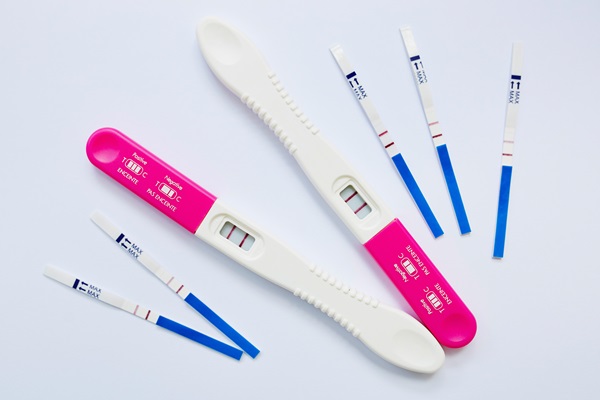Over-the-Counter vs Clinical Pregnancy Testing

Awaiting the results of a pregnancy test can be nerve-wracking, regardless of whether or not you are planning for a baby. Pregnancy testing can provide clarity about what to do next. The good news is that these days, there are many different options available. You can buy a home pregnancy test over the counter or visit a clinic for one. Here is what you should know when trying to choose between the two.
How pregnancy testing works
Pregnancy testing looks for the presence of human chorionic gonadotropin, or hCG. The body only makes hCG when pregnant to stop menstruation and better prepare the womb for the embryo. A pregnant patient should produce enough hCG to be detectable in the urine around day 10 after conception. Levels of hCG will continue to rise until the tail end of the first trimester.
Both home and clinical pregnancy tests rely on there being detectable levels of hCG. It is important not to test too early, as this can deliver a false negative result. Note that a negative test result means the patient is not pregnant; a positive test result means they are pregnant.
How soon can you take a pregnancy test?
While most people think they must wait until they miss their period, pregnancy testing can be effective as soon as 10 days after conception. In other words, 10 days after unprotected sex. However, it is recommended to wait at least three weeks after the date of unprotected sex or as soon as the patient misses their period. This is to prevent a false negative or false positive result.
Remember that it is common to miss one’s period without being pregnant. Many factors could cause a patient’s cycle to be late. Some examples are stress, weight gain or loss, injuries, or even a new workout routine. That said, if one’s period is a few weeks late and pregnancy tests continue to come up negative, it is a good idea to see a medical doctor to ensure there is no underlying health condition or faulty testing mechanism.
Choosing which test is right for you
Home pregnancy tests
Home pregnancy tests are available over the counter at most drugstores, dollar stores, and grocery stores. A major benefit of these tests is that patients can take them in the comfort of their own homes. They are also highly accurate (most are 99% accurate when used correctly). Still, there is a chance for user error. Over-the-counter tests stored incorrectly (such as in a hot car), left in the urine for too long, or expired can give a false negative or positive result.
When to go to a clinic for pregnancy testing
Clinical pregnancy testing requires the patient to visit a medical office and give a urine or blood sample. Urine tests will be similar to home pregnancy testing, while blood tests detect hCG presence in addition to its concentration. Sometimes, the provider will need to perform an ultrasound to confirm a pregnancy.
Our team of professionals has the expertise to provide these tests with minimal to no issues, providing much-needed peace of mind to patients. Further, if pregnancy is confirmed, patients can review their options with the doctor immediately.
Get more information
Whether your period is late or you are trying for a baby and want to know as soon as possible, visit our Fairfax clinic for pregnancy testing. We can handle everything for you, so you do not have to worry about whether you bought the “right” or “most accurate” home pregnancy test. Call (703) 372-4429 today to schedule an appointment.
Request an appointment here: https://millenniummedicalcare.com or call Millennium Medical Care at (703) 372-4429 for an appointment in our Fairfax office.
Check out what others are saying about our services on Yelp: Pregnancy Testing in Fairfax, VA.
Recent Posts
Getting the common cold is hardly an unusual occurrence. This sickness afflicts people of all ages perhaps more than any other health condition. Some people only get minor symptoms that go away within a few days. But other people can suffer significantly with a variety of ailments. It is helpful to understand what causes colds.…
Liver testing helps identify liver inflammation, injury, or reduced liver function before serious complications develop. Both urgent and primary care providers use these blood tests to investigate symptoms, evaluate abnormal findings, and monitor known liver disease or medication effects. Liver testing often includes liver enzymes and proteins that reflect liver-cell injury and the liver's ability…
If you recently had the common cold, you are hardly alone. This is likely the most frequent illness that medical professionals treat and that people deal with. The symptoms can range from minor to severe and everywhere in between. You may recover fully within a couple of days, or the cold may hang on for…
Having a common cold is more than just having the sniffles. It can weaken you and make you miserable. The upside to this is that it is self-limiting. But you will be contagious during its onslaught. If you want to know more about the common cold and how a viral infection happens, here are the…


